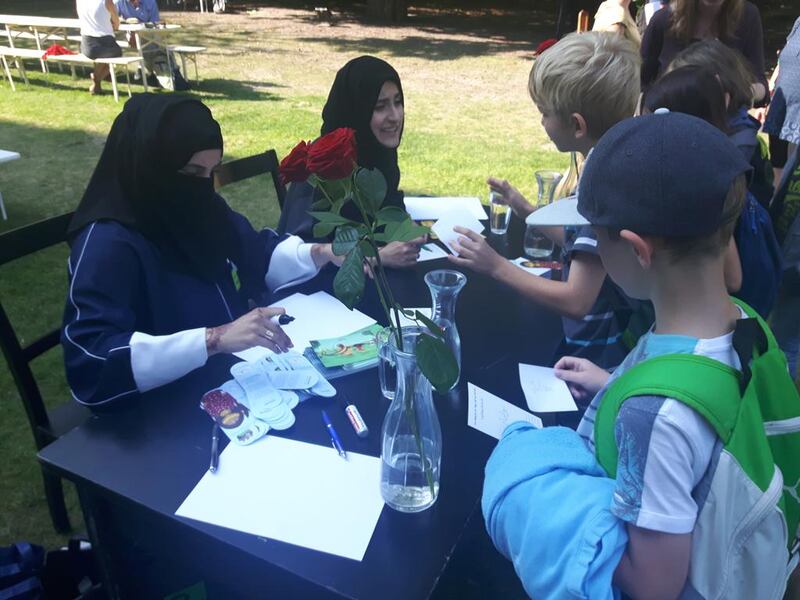While settling into a new place, you always have a warm feeling if you see, hear or taste something familiar. That feeling can be most vivid for those who flee war. For example, a children’s story might describe how a girl arranges her veil; a father joins Friday prayers; or a family gathers to share sweet tea. That’s why storytelling is helping thousands of refugee children from Syria, Iraq and Afghanistan to reconnect with their roots even as they adjust to their new lives in Europe.
Maitha Al Khayat and Noura Al Khoori, Emirati authors of children’s books, created this experience by holding a series of readings for refugees in Berlin recently, visiting the children in classrooms, a library and at their accommodation. The visit was part of the Berlin International Literature Festival which was held in late September.
Al Khoori, from Abu Dhabi, has just published The White Hands, which describes a refugee boy's journey from his homeland to a neighbouring country. In 2013, the young mother published her first book Fanteer the Fluffy Flamingo, followed by The Golden Dates. Listening to The Golden Dates in Berlin, a girl from Syria whispered to her friend: "We are also sitting on the floor and having tea!" And after the readings, many children moved closer to the authors, taking their hands and chatting with them excitedly.
Al Khoori says: “I felt as if they found a magical home in the books. I wish that such an initiative to let kids connect back to their roots through books is kept alive and regular.”
Al Khayat, from Ras Al Khaimah, also presented her book, My Own Special Way. The mother of five has written 17 books, including I Love My Dad's Long Beard and I Love My Mum's Pretty Veil.
She says: “The refugee kids could relate to different parts of our stories. Even though we had to switch to [the] Syrian dialect when telling our stories in Arabic, their knowledge of their mother tongue was impressive.”
Due to the influx of refugees, there is a growing need for Arabic children’s literature in the German education system – for the cultural enrichment of both Arab and German children. But there is a shortage of these books in the publishing market. Children at the readings asked Al Khayat and Al Khoori for more stories.
Christoph Rieger, director of the children’s and youth programme at the Berlin International Literature Festival, says: “The richness of storytelling of Arabic writers must be made even more visible in children’s books with a literary quality.”
Here, the Government has declared 2016 as the “Year of Reading”, in order to strengthen people’s affection for literature.Literature can also support the integration of refugees. For example, the project “Comic Connections” is building a steady solidarity in Berlin, where comic artists from both Syria and the German capital have held weekly workshops with refugee children since February.
Another initiative in Germany is the Poetry Project. “Poetry is a good bridge to cross foreignness. That was our idea when we started The Poetry Project,” says founder Susanne Töpel. She explains how teenage boys from Afghanistan and Iran, who have fled to Europe, have met mentors in Berlin for the past eight months. They have written about their loneliness, fears and their families. Eighteen-year-old Mohamad Mashghdost from Iran wrote: “I wanted to leave. And I stayed. I wanted to stay. And I left. Leaving was not important. And neither was staying. I was important, I, who did not exist.”
Ulrich Schreiber, founder and director of the Berlin International Literature Festival, invited the teenagers to the festival.
“I never heard that kind of poetry before,” he says.
“This project can lead to the birth of young poets. A lot of people in the audience at the festival had to swallow their tears.”
At the festival, Al Khayat and Al Khoori also held a reading for 290 children. They bubbled with questions such as: “Why do you wear the veils?”; “Why are the men wearing white clothes and women don’t?”; and “Isn’t it hot in the black dresses?”
Al Khayat says: “Their questions showed tolerance and curiosity. They even found it cool for me to wear the niqab.”
The writers presented a slideshow comparing family life in Germany and in the UAE, with images of the subway in Berlin and Dubai, and of German cars in Dubai. “Oh! My parents are driving the same car,” shouted one boy.
A teacher said: “Especially in intercultural encounters, everything is too focused on the differences between cultures and individuals. We need to focus more on commonality and connecting, so we are able to form a bridge between the cultures.”
Al Khayat and Al Khoori hope to strengthen that bridge between Arab and German culture. Hopefully Arabic literature for children and young adults will develop as swiftly as the refugees’ sense of safety in their new homes.
Birte Hendricks is a writer based in Germany.





